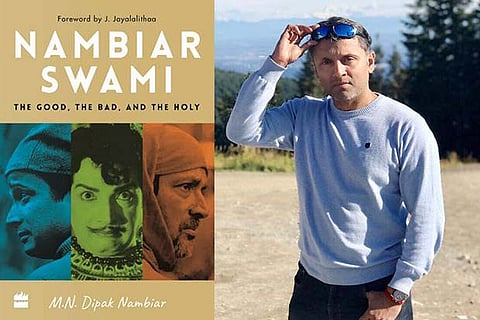

Chennai
Only a few actors in Tamil cinema have been as loved as MN Nambiar. Admired for his intense acting prowess, particularly his portrayal of villains, he was also revered as a guruswami (spiritual leader). The book, Nambiar Swami, provides an in-depth look into his public persona and personal life, which he fastidiously kept separate from one another.
From growing up in Ooty and joining the gritty world of travelling drama troupes to achieving stellar success in the Tamil film industry, this book takes the reader on an engaging journey narrated by the man himself, as told to his grandson Dipak Nambiar. The light biography details many anecdotes from his family and best friends MGR and Sivaji Ganesan.
Talking about penning down the life of his grandfather, Dipak shares, “It was like the path leading to the Sabarimala shrine. Miles and miles that were filled with thorns and sharp stones — but so worth it once the journey was completed. As a first-time author, I had to chase some celebrities for years before they’d sit down for an interview. I doubted myself over the 15 years it took to write the book. But when it was all said and done, the feeling of accomplishment was wonderful.”
Growing up with a great man, Dipak did not realise his legend until he started living half a world away, in the US. “Sometimes, distance is needed to gain perspective. I took so many things for granted, raised as Nambiarji’s son; that all men will always be madly in love with and faithful to their wives, honesty is something you give and (therefore) can expect, and respect is something that you don’t have to work hard for. MN Nambiar was beloved simply because he was someone who practised what he preached. The principles he espoused were fidelity to his wife bordering on devotion, an honest teetotaller and a person who did so much for the needy,” says the author.
The book narrates MN Nambiar’s life — his poor childhood, having to earn money from the age of 12, struggles in drama, transitioning to movies and thereafter, finding stardom, and lastly, his devotion to his wife Rugmini and to Lord Ayyappa. “Nambiarji had an irreverent sense of humour, he found laughs in the most mundane situations. One anecdote from the book is — he’d just built a spanking new house and when he went to the balcony to catch the early morning sunrise, he actually found a local man mooning him. The guy was taking a dump right in front of Nambiarji’s gate.
Aghast, my grandfather asked him if the offending defecator didn’t see a beautiful house right in front of him. The man replied, ‘You built this house yesterday, I’ve been shitting here the last 25 years.’ Can’t argue with that kind of logic,” remembers Dipak.
Most of the audience admired Nambiar as an on-screen villain who brilliantly portrayed his roles. “But he was the polar opposite of the bad man we saw on the screen. The only thing he killed were with his jokes.
An extremely funny and family-oriented person who kept his personal and professional lives separate. When his kids were born, he was a busy superstar. When I was born, he was slowly transitioning into character roles and had more time, so he got his wish to be a hands-on dad with me. I was literally the child he raised and I see a lot of appa in me.”
Another interesting fact about Nambiar is that he was an exponent of sword-fighting, kalaripayattu and wrestling. “I’m trained in karate by my uncle and have ‘practised’ my fighting skills in actual street-fight situations. But even when I was 25 and my grandpa was 75, I’d lose every time we wrestled. And every time he’d pin me down, I’d look up with defeated chagrin to see the most loving face ever. He’d pull me up to my feet, tell me how proud he was of me and then gently explain the mistakes I made. He wasn’t my father, he was my god,” he says.
To sum up, the book is a fascinating portrait of the great actor who was equally adept in his roles as a hero and a villain and widely respected as a spiritual man.
Visit news.dtnext.in to explore our interactive epaper!
Download the DT Next app for more exciting features!
Click here for iOS
Click here for Android